Ethiopia: The Home of Coffee
To taste amazing (without additives or extra processing), coffee needs to grow in the right environment. For millennia, Ethiopia has had just that. Thanks to its mountainous southern regions and deep, rich soil, Ethiopia is the natural home of thousands of coffee varieties.
In these ideal conditions, coffee can be grown in Ethiopia without the need for agricultural chemicals, making Ethiopian beans superior in quality. This comes in sharp contrast with many with other parts of the world where coffee farmers often have no choice but to use chemicals, engineered varieties, or by providing artificial shade for coffee trees. Instead, when you get beans from Ethiopia, you are getting coffee as it was meant to be.
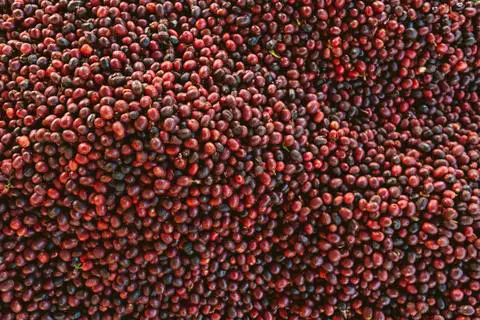
For your information, if you click on a product on Jayarrcoffee.com and decide to buy it, we may earn a small commission.
Table of Contents
The Flavors of Ethiopian Coffee: What Should You Expect
Ethiopian coffee is renowned for its floral and bright, fruity flavors- usually with a higher acidity, a light to medium body, and a complex flavor profile. Ethiopian coffees are also one of the rare places you can experience blueberry notes. People are often looking for a “blueberry bomb” coffee and, really, you should look no farther than Ethiopian coffees! Do note that not all Ethiopian coffes exhibit blueberry notes- it all depends on variety and processing method.
Ethopian coffee beans can be either naturally processed or washed. The method used for processing has a huge role in the coffee’s final taste. Most Ethiopian coffee exports are processed naturally. Natural processing is the traditional method, having been done that way for centuries any major changes. However, wet processing is becoming more common as the equipment required for it continues to improve.
Natural processed coffee tends to be fruitier and sweeter as the bean spends a longer time inside the coffee cherry. In contrast, washed coffee tends to carry a flavor more representative of the seed/bean itself.
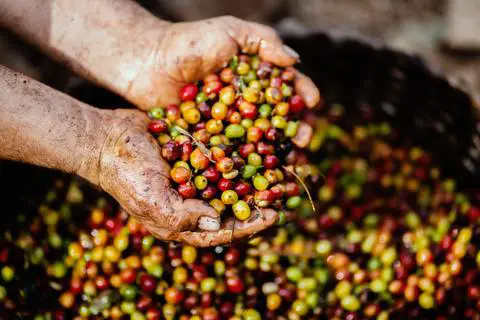
Major Ethiopian Coffee Varieties
Until 1995, Ethiopia was divided into different provinces. Now, Ethiopia is now split into districts; however, the old province names are still used to indicate region, particularly when it comes to coffee. Sidama or Sidamo was the country’s southernmost province, and many coffee plantations continue to grow coffee there today.
Yirgacheffe, a small town famous for producing some of the world’s best coffee beans, is located in the Sidama region. Most producers in Yirgacheffe favor wet processing, yielding brighter coffee beans with lighter bodies, higher acidity levels, sweet floral notes, and fruity flavors.
Guji is also another prominent coffee-producing region that is located south of Sidama. The world’s best roasters regularly flock to Guji for their beans. Guji beans tend to have a tea-like body and sweet floral notes, such as jasmine with peach and melon.
Farther east you can find Harrar, where delicious, dry-processed coffee beans with syrupy bodies are produced. These beans tend to have a wild, fruity character and a winey taste. Some Harrar coffees are labeled as Mocha Harrar, so named for the famous Red Sea port where the world’s finest coffee beans were shipped to the rest of the world.

Ethiopian Coffee Bean Review: Summary

Peet’s Ethiopian Super Natural

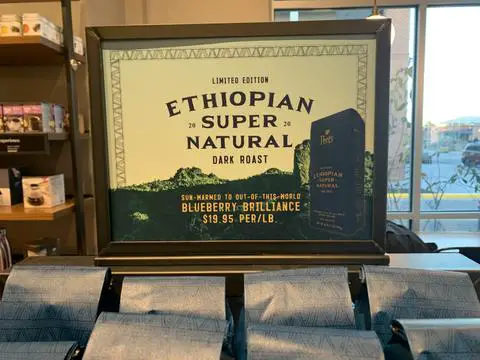
Here “natural” means the beans have been sundried with the two seeds present inside the coffee cherry. This allows the beans to absorb the natural sweeteners in the fruit during the drying phase. Many growers were reluctant to try this technique using their prized fruits, but the popularity of these beans has made this technique more common.
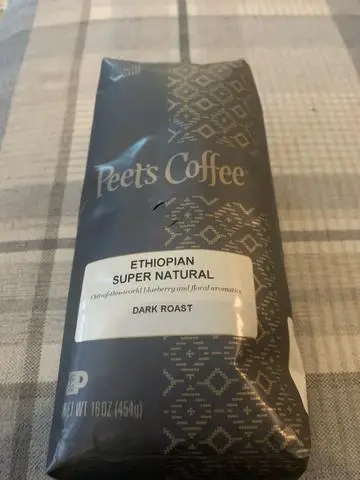
Peet’s Ethiopian Super Natural is a limited release coffee that Peet’s promotes heavily both online and in-stores. However, this promotion is with good reason- Peet’s Ethiopian Super Natural is a rare example of a major chain coffee that packs strong, natural blueberry notes. It’s also a coffee likely to be a crowd pleaser as it isn’t terribly acidic and is lower toned. We’d highly recommend picking up a bag while its available!

Taste: Sweet and full. Fragrantly fruity with prominent dried blueberry and white flower. Really a very delicious coffee..
Coava Coffee Kilenso Ethiopia

Farmers in Kilenso Mokonissa, Sidama, often follow organic practices but aren’t certified because of the high costs involved in certification. Coffee originating from Kilenso used to be blended into larger lots later sold as Ardi, a general term for all coffee exports from this region. But once Coava decided to roast Kilenso beans separately, this region’s beans quickly became a customer favorite. Plus, all beans are cleaned with natural processing methods.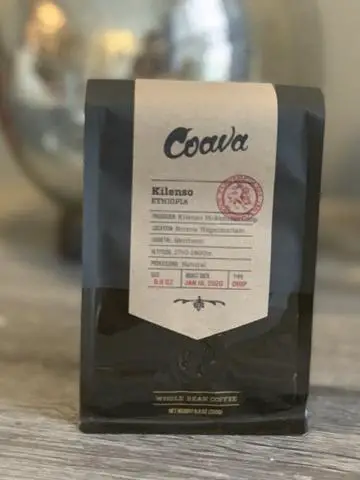
We really enjoyed this coffee. While this coffee exhibits strong blueberry notes, they are much different than those of Peet’s Ethiopian Super Natural. Coava’s blueberry is much brighter/acidic and, although this is a phenomenal coffee, it may not appeal to all palettes. It also had a nutty/pastry-ish quality. As an aside, the packaging was quite elegant. Definitely worth a try and is, in many ways, the coffee on this list most emblematic of Ethiopian coffee generally.
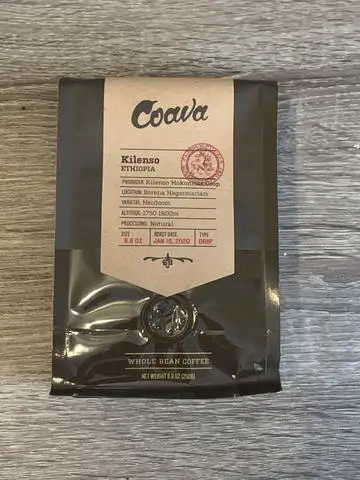
Taste: Blueberry, Almond biscotti, jam, and lavender. A stunning and unique coffee that is incredible no matter how it’s prepared.
La Colombe Yirgacheffe
Every coffee plant in the world can trace its lineage back to the plants of the Ethiopian highlands. Ethiopia’s highland region of Yirgacheffe happens to be famous for its distinct fruity and floral coffee beans. Thanks to modern processing methods, the beans in this La Colombe roast have a medium body. This is a very easy coffee to recommend and is a great example of a Yirgacheffe.
Taste: Vibrant and delicious. A hint of grassiness, along with a higher, tangy acidity level that makes it a great coffee to sip and savor black. It’s a bright cup with a sweet flavor that’s balanced with traces of honey, citrus, and fruity flavors.

Volcanica Ethiopian Yirgacheffe

This roast comes from Ethiopia’s Yirgacheffe region, where coffee trees grow in the wild. Beans not collected in the wild are sourced from estates or farms. Volcanica is known for roasting fresh coffee beans and shipping them out faster than its competitors. This is a fun coffee with interesting flavors that are a slight twist on the traditional Yirgacheffe; we’d rank it right along side La Colombe and would definitely recommend trying!
Taste: Noticeably strong floral and fruity notes, with lavender, dark chocolate, guava, pineapple, and ripe strawberry.

Birch Coffee Ethiopia Yirgacheffe

There’s not a ton of information available about Birch Coffee’s Ethiopia Yirgacheffe, outside of it being grown at an altitude of ~5,000 feet and being roasted by New York City chain Birch Coffee. The packaging Birch uses is always pretty sharp looking. Overall, this coffee is good but maybe not quite as good as the other two Yirgacheffes above.
Taste: A tangy light-bodied coffee with fruity layers. Notes of floral, honey, strawberry, and lemon, with a touch of grassiness. Ideal to sip black.
Cooper’s Ethiopian Whole Bean Coffee
If you’re passionate about supporting small-time Ethiopian coffee farmers, Cooper’s Ethiopian Whole Bean Coffee is a great choice. This roast distinguishes itself by using Farm Gate coffee beans, which means the beans were bought directly at the farmer’s gate. Since these beans come from a single farm or field, they are also categorized as single-origin and micro-lot coffee products. However, unlike Volcanica, there isn’t any guarantee that these beans were roasted promptly, since no roast dates are mentioned on the packages. Cooper’s was not a bad coffee by any means, but it would be hard to recommend it over some of the options higher on our list.

Taste: Floral notes of nectar, raw honey, lemon tart, coupled with with a citrusy vibe.
Jim’s Organic Ethiopian Sidamo Nura Korate Coffee

Jim’s Organic promises “from farm to roast to brew”- highlighting their traceability, roasting experience, and interesting flavor. This particular Ethiopian Sidamo comes from Nura Korate, which is part of the the Sidamo Coffee Farmers Co-op. We weren’t quite as impressed with this coffee. While it wasn’t a bad coffee, it didn’t taste particularly fresh and it was hard to parse out what smoky flavor was intended flavor from the bean versus what was a result of overroasting.
Taste: A decent dark roast coffee with hints of cocoa and fruit. Smoky, burnt flavor, with low acidity and sweetness, and a vegetal, woody taste. While not particularly delicious, it wasn’t terrible either.
Be sure to check out our coffee review master list for more GREAT coffees!



